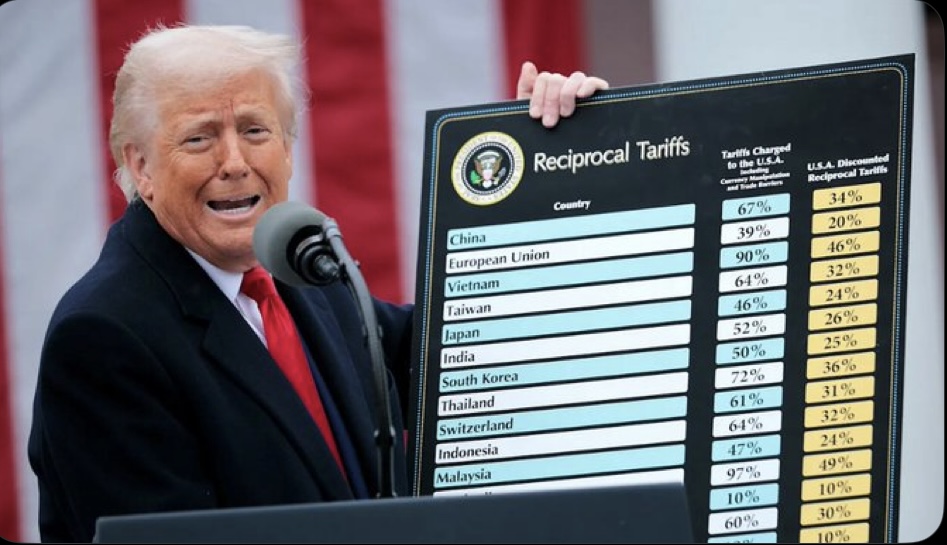Trump Announces $2,000 ‘Tariff Dividend’ for Americans, Excluding High-Income Earners

In a move that has reignited debate over trade policy and executive authority, U.S. President, Donald Trump announced on Sunday, that Americans will receive a “tariff dividend” of at least $2,000 per person, funded by revenue collected from tariffs on imported goods.
The announcement was made via Trump’s social media platform, where he emphasized that the payouts would exclude “high-income people,” though he did not specify the income threshold for eligibility Trump framed the initiative as part of a broader strategy to ensure Americans directly benefit from his trade policies. “A dividend of at least $2,000 a person (not including high-income people!) will be paid to everyone,” Trump wrote. He added that the United States is “the richest, most respected country in the world, with almost no inflation and a record stock market price,” highlighting what he described as the economic success of his administration’s policies The proposal would use revenue raised from tariffs imposed on imported goods — a hallmark of Trump’s trade strategy — to fund the payouts. While Trump claims that “trillions” of dollars have been collected, official figures indicate that U.S. tariff revenue in 2025 has totaled approximately $195 billion between January and September. Analysts have noted that the cost of paying $2,000 to every eligible American could be significant and may exceed the total tariff revenue, depending on how broadly the program is implemented Legal and legislative hurdles remain major obstacles for the plan. The Supreme Court is currently reviewing challenges to the tariffs under the International Emergency Economic Powers Act (IEEPA), which could determine whether Trump had the authority to impose the tariffs in the first place. Should the Court rule against the administration, the legal foundation for the dividend could collapse, and revenue could be reduced or refunded Even if tariffs remain in place, the distribution of the $2,000 dividend would likely require congressional approval. Currently, there are no detailed plans regarding the rollout, eligibility criteria, or whether the dividend would take the form of a direct cash payment or adjustments to taxes and benefits. Treasury Secretary, Scott Bessent has suggested that the dividend could include measures such as tax reductions on Social Security, tips, overtime, or auto loan deductibility Political analysts say the announcement is likely aimed at bolstering Trump’s popularity ahead of the 2026 election cycle by promising tangible financial benefits to Americans amid ongoing concerns about cost-of-living pressures and inflation This tariff dividend is an unprecedented approach to using trade policy revenue to provide direct benefits to the American people,” said Marcus Delaney, a Washington-based economist. “It raises critical questions about executive authority, congressional oversight, and the long-term sustainability of such payouts While the announcement has energized some supporters who view it as a tangible reward from Trump’s trade policies, critics argue it could have negative fiscal implications. The U.S. national debt currently stands at approximately $38 trillion, and funding such a broad dividend could put additional pressure on the federal budget if revenue falls short As Americans await further details, key issues remain unresolved: the final legal outcome of the tariff challenges, the specific criteria for who qualifies as “high income,” the method of payment, and whether Congress will take action to authorize the program. Economists and lawmakers alike are closely monitoring the situation, noting that the effectiveness and feasibility of the $2,000 dividend will depend heavily on these variables. Trump’s announcement has already sparked debate on Capitol Hill, with some lawmakers applauding the idea of returning tariff revenue to citizens, while others caution that the plan could exacerbate budgetary constraints and introduce economic distortions if implemented hastily With the Supreme Court review and potential congressional negotiations ahead, the fate of Trump’s “tariff dividend” remains uncertain. However, the proposal underscores the former president’s continued influence in U.S. political discourse and his strategy of linking trade policy to direct financial benefits for Americans.









